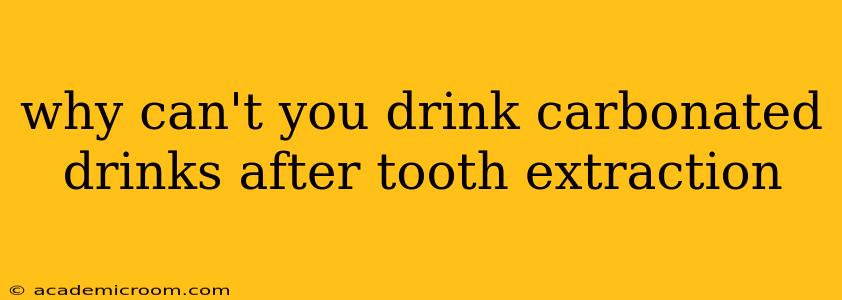Following a tooth extraction, your mouth is in a delicate state of healing. The socket where the tooth was removed is a vulnerable area, prone to infection and complications. Carbonated drinks, while seemingly innocuous, can actually hinder this healing process in several ways. This post will explore the reasons why dentists strongly advise against consuming fizzy drinks after an extraction.
What Happens During Tooth Extraction?
Before delving into the reasons, let's briefly understand what happens during a tooth extraction. The procedure involves removing a tooth from its socket in the jawbone. This creates an open wound, a blood clot forms naturally to begin the healing process. This clot acts as a crucial protective barrier, preventing infection and promoting bone regeneration.
Why Are Carbonated Drinks a Problem After Extraction?
Several properties of carbonated drinks make them problematic after a tooth extraction:
1. Pressure and the Blood Clot:
The carbonation in these drinks creates pressure. This pressure can dislodge the crucial blood clot forming in the extraction site. If the clot is dislodged, it can lead to a painful and potentially serious complication called dry socket. Dry socket is characterized by intense pain, exposed bone, and a significantly delayed healing process. It often requires additional treatment from your dentist.
2. Acidity and Irritation:
Many carbonated drinks are acidic. This acidity can irritate the already sensitive extraction site, increasing inflammation and pain. The delicate tissues are struggling to heal, and the added acidity only exacerbates the problem. This can prolong recovery time and potentially increase the risk of infection.
3. Sugar Content:
Many carbonated drinks are loaded with sugar. Sugar fuels bacterial growth, increasing the risk of infection in the already vulnerable extraction site. Bacteria thrive in a sugary environment and can significantly impede the healing process, potentially leading to complications.
4. Increased Risk of Infection:
The combined effect of pressure, acidity, and sugar creates a perfect storm for infection. The extraction site is a direct entry point for bacteria, and these drinks increase the likelihood of those bacteria taking hold and causing problems. Infections can delay healing, increase pain, and potentially lead to more serious complications requiring antibiotics or further intervention.
What Drinks Are Okay After Tooth Extraction?
Instead of carbonated drinks, opt for:
- Water: The best choice for hydration and promoting healing.
- Smoothies (without straws): Nutrient-rich and gentle on the extraction site. Avoid using a straw, as suction can dislodge the clot.
- Clear broths: Provide hydration and electrolytes.
How Long Should I Avoid Carbonated Drinks After Extraction?
The recommended timeframe varies depending on individual healing, but it's generally advisable to avoid carbonated drinks for at least 24-72 hours after extraction, or until your dentist gives you the all-clear.
What if I Accidentally Drink a Carbonated Drink?
If you accidentally consume a carbonated drink after your extraction, don't panic. However, be vigilant for any signs of dry socket or infection, such as:
- Severe pain
- Persistent bleeding
- Bad breath
- Foul-tasting discharge
- Visible bone in the extraction site
If you notice any of these symptoms, contact your dentist immediately.
Conclusion:
Avoiding carbonated drinks after a tooth extraction is crucial for ensuring a smooth and speedy recovery. The potential complications far outweigh the temporary satisfaction of a fizzy drink. Prioritize your oral health and follow your dentist's advice for optimal healing.
